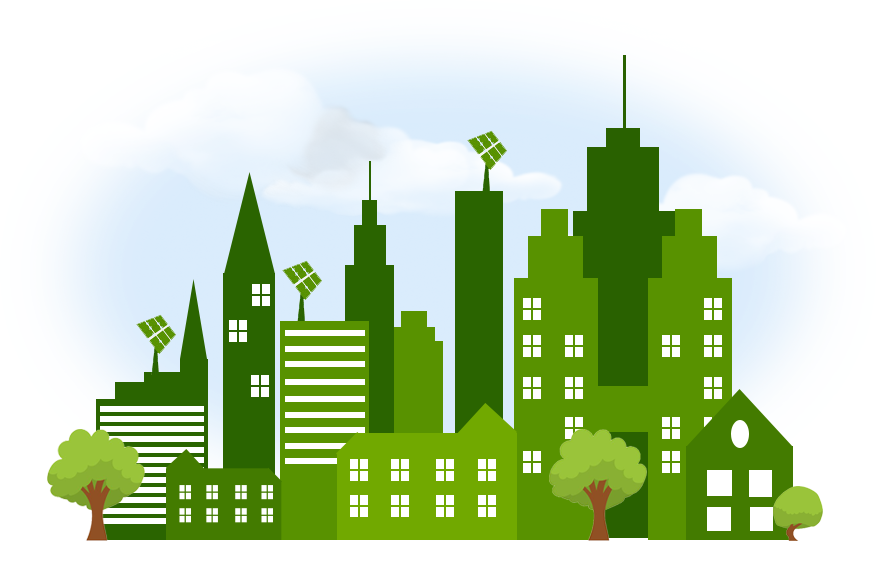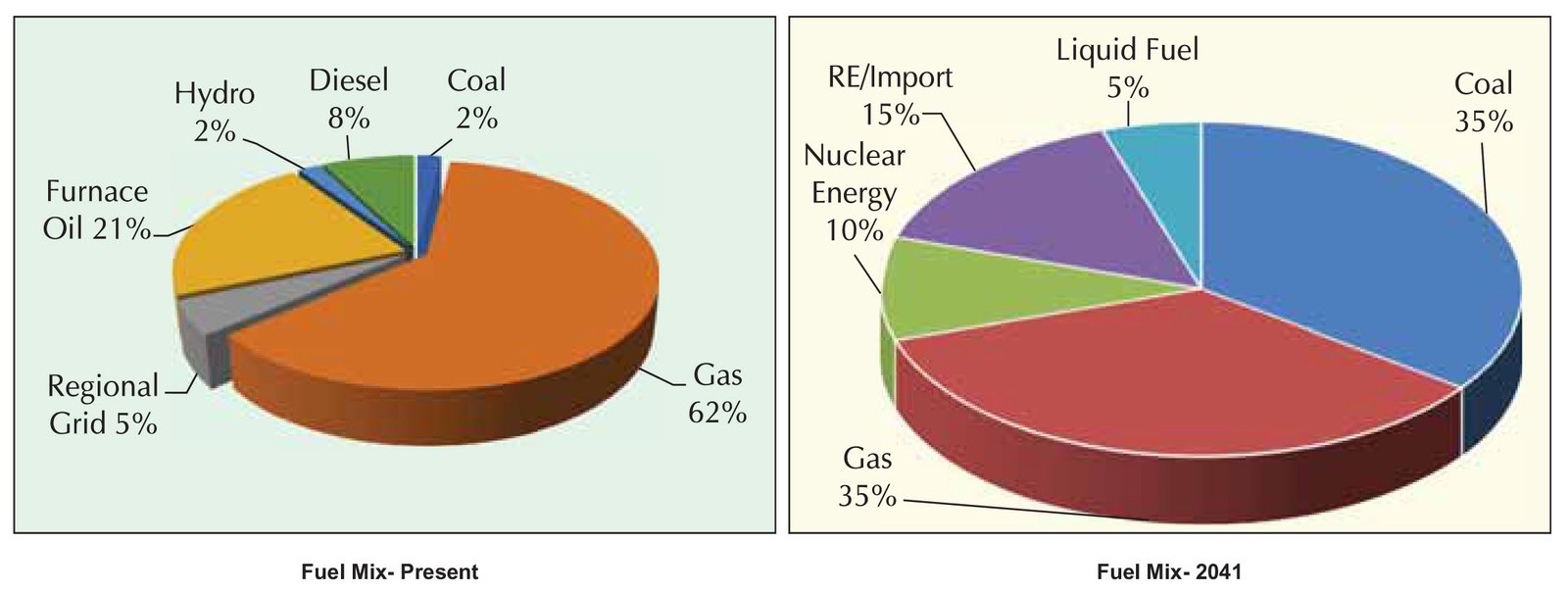
Bangladesh, like any other emerging developing country, cannot overlook the pivotal role of the power sector in fueling its overall development. All the sectors require a constant and reliable source of electricity for the economy to function and grow. It’s an undeniable fact that energy has become one of the most important factors for better economic growth and people’s life in Bangladesh. After decades of dependency on domestic natural gas, we find ourselves not equipped with sufficient energy resources in our land, and will gradually rely on imported fuels. Also, we are well aware that the Greenhouse Gas (GHG) emission accelerates global warming, causes climate change and creates havoc to our country by natural calamities. Still, we are committed to the transformation of a happy and prosperous Bangladesh by implementing 'vision 2021' and ‘vision 2041 as announced by our Hon'ble Prime Minister Sheikh Hasina. As a result, the government has taken various initiatives to make electricity generation more efficient and affordable for the masses.
Operational Efficiency of Generation Plants:Efficient operation and maintenance (O&M) of the running power plants have been a long-standing critical challenge. Many of the power plants owned by Bangladesh Power Development Board (BPDB) are age old and running inefficiently. These have become a burden for the sector and need to be augmented. Some of those would require to be retired and replaced by the new ones with modern efficient technology to increase generation efficiency in power sector. We have emphasized the development of new power plants to quickly respond to the growing demand for electricity, and also paid adequate attention to augment the existing plants as well. Bangladesh now sees as large as 22% (or equivalent to 2,200 MW) capacity loss from the installed capacity of 10,000 MW of old power plants. This loss could have been minimized with appropriate augmentation. Adoption and implementation of a proper O&M is of highest priority of the government. Related to this, there is a huge potential for re-powering the existing simple-cycle gas power plants through upgrading them as combined-cycle gas turbine (CCGT). Re-powering and replacement of existing simple cycle gas turbines can free up enough gas to run an additional 600-700 MW baseload CCGT that would eliminate the substantial supply shortfall in the short term. This option has been known for years now and efforts are currently underway for repowering some of the Ghorasal units. There are several similar projects that could be pursued more aggressively. The longer-term view of limited gas and hence the need to conserve gas is paramount – it requires taking hard decision in the short-term to conserve as much gas as possible.

Captive Power Plants:The government is planning to bring the industries to the grid and gradually reduce the dependency on captive power plants. The government began to allow captive power generation during the mid-1990s due to an unreliable power supply. Around 17% of the total gas consumed currently goes to the captive power plants, which generate around 3,000 MW of electricity. These are basically engine-based and inefficient. The government has also directed the existing captive power plants to increase their thermal efficiency to at least 60%. In order to achieve the 60% target, the captive power plants have been asked to start cogeneration process. Currently, more than 80% of the captive generators in the country are releasing their flue gas into the atmosphere. Some captive plants have already been converted to combined heat and power (CHP) to tackle the severe shortage of gas, but 70% of the flue gas collectively released by the existing captive power plants is still being wasted. Instead, the government has taken initiatives to establish several larger coal and LNG-based more energy-efficient power plants throughout the country.
Fuel Diversification: Natural gas is currently the main fuel for power generation in Bangladesh, but this finite resource won’t last forever. Recognizing the importance of primary fuel for power generation, the government is diversifying the fuel mix by gradually shifting to coal, LNG, and other available fuel besides gas. To ensure energy security, the government has prepared PSMP-2016 considering gas, coal, LNG, liquid fuel, dual-fuel, nuclear and renewable energy resources. The governmenthas also taken initiatives to import power from neighboring countries.
Use of Modern Technology: Use of information and communication technology (ICT) solutions is key enablers for improving the efficiency of the power sector. Considering the requirements of Bangladesh, we foresee that information and operational technologies shall play a critical role in Bangladesh’s power sector. With the ongoing plans for the implementation of enterprise resource planning (ERP) systems, geographical information system (GIS), metering-billing-collection (MBC) system, supervisory control and data acquisition (SCADA) system, underground substations, etc., the utilities in Bangladesh are well placed to keep pace with the global trends. At present several power plants are being built using ultra-super critical technology.
Efficiency Improvement in Transmission: Transmission capacity in Bangladesh is not growing fast enough to cope up with the power generation, resulting in supply bottlenecks in important commercial corridors and industrial hubs. Unexpected outages, like the November 2014 countrywide blackout, perpetuate concerns about the security and stability of the country’s power grid. Power system frequency in Bangladesh varies routinely on normal days between 48.9-51.2 Hz, going as low as 48.7 Hz and as high as 51.5 Hz under contingency. This is a major impediment to system efficiency and reliability and also causes severe economic loss including out-of-merit dispatch. We are trying to augment the transmission system up to N-1 principle such that there is adequate redundancy in the system. In order to achieve this we have taken several transmission projects to add more transmission lines and grid sub-stations. Proper monitoring tools with SCADA, EMS have been introduced. Our aim is to transform the grid into SMART grid system.
Efficiency Improvement in Distribution Sector: Thepresentcapacity of distribution lines in Bangladesh is about 550,000 kilometers and sub-station capacity is about 20,000 MVA. Despite significant improvements, the current infrastructure is not enough to ensure an uninterrupted supply for all by 2021. A huge number of new distribution lines and sub-stations will need to be constructed to fulfill that goal. Distribution network is being improved through upgradation of distribution lines and substations, installation of capacitor bank/PFI plants, implementation of pre-payment metering system, reduction of technical and non-technical losses, etc. The government has decided to develop underground distribution system in major cities of the country. The aim is to provide the facility of modern cities with an advance electricity supply system. DPDC and DESCO have adopted several plans to establish underground distribution substations and supply lines to switch to modern country’s practice of having underground power-distribution system. At the same time, the consumers are also encouraged to use the efficient appliances. Massive awareness campaign are going on to aware the consumers about energy saving and conservation.
The government has prepared the Energy Efficiency Master Plan, which aims at a reduction of 15 percent by 2021 and 20 percent reduction in energy intensity of GDP by 2030.Despite the enormous potential for EE across all sectors in Bangladesh, there are considerable barriers to large-scale EE adoption and market transformation, particularly across various demand-side sectors. The government has taken all out efforts to develop the power sector in a sustainable way. We firmly believe that we will be able to ensure an efficient power sector and provide quality electricity for the citizen of the country.
Mohammad Hossain
Director General
Power Cell, Power Division



